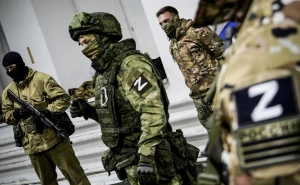
ISW explains why Putin tries to downplay drone attack on Moscow
Russian dictator Vladimir Putin is trying to downplay the significance and impact of the drone attack on Moscow and its suburbs that took place on May 30. In this way, he tries to hide his limited ability to "respond"
This is stated in the report of the Institute for the Study of War.
Analysts note that recent complaints by Russian bloggers about the supposed lack of escalation by the Russian Federation in response to the raid in Belgorod region and the drone strike in Moscow region "do no credit" to the occupiers in the unprecedented scale of their aerial campaign against Kyiv.
Many bloggers and personalities, including the former Russian officer Igor Girkin and the financier of the Wagner PMC Yevgeny Prigozhin, have repeatedly complained about the lack of full-scale general and economic mobilization in Russia, which, according to them, is the only possible measure capable of satisfying the widespread protest in the information space.
"Russian President Vladimir Putin attempted to downplay the drone attack on Moscow to avoid exposing the limited options he has to retaliate against Ukraine," ISW believes.
Putin claimed that Russian forces struck the Ukrainian military intelligence headquarters “two [to] three days ago” and claimed that the Russian Armed Forces continue to respond to Ukraine’s “war against Donbas” by striking Ukrainian military infrastructure.
Putin also hinted that the drone strike on Moscow was Kyiv's response to Russian strikes.
"The Russian MoD conveniently claimed on May 30 that Russian forces carried out “a group of strikes with long-range high-precision air-launched weapons at main decision-making centers” in Ukraine. The Russian MoD did not claim that it had struck the Ukrainian military intelligence headquarters recently and there is no available confirmation of Putin’s claim," analysts say.
Instead, the Russian president said that Ukraine is trying to provoke a response and force Russia to "mirror" its actions.
Putin's emphasis on past and current missile attacks is probably an attempt to show that the Russian Federation is already actively taking measures in response and does not need to react "to further Ukrainian provocations", according to experts.
"Putin has consistently retaliated against genuine and purported Ukrainian actions by ordering massive missile and drone campaigns, likely due to Russian forces’ inability to achieve any decisive effects on the battlefield," the publication said.
In addition, the dictator advanced numerous Kremlin-style narratives aimed at maintaining domestic support for Russia's military effort and bullying the West. Putin also noted that, while the Moscow air defense systems “worked normally,” Russia still needs to “work” on improving these systems.
According to the Institute, this is a visible attempt to forestall criticism from Russian ultra-nationalists, who have criticized Russia's ineffective air defense systems in Moscow and along Russia's border regions with Ukraine.
Putin also accused Ukraine of threatening to destabilize the Zaporizhzhia Nuclear Power Plant (ZNPP) and using “dirty devices” – both default Russian false narratives that the Kremlin uses during Russian military failures.
Drone attack on Moscow
On the morning of May 30, reports emerged of explosions in Moscow and its suburbs attributed to drone attacks by the Russians. Sergei Sobyanin, the mayor of Moscow, confirmed minor damage to several buildings and the evacuation of residents from certain high-rise buildings. Russian sources released footage of the attack.
A Russian military commander claimed that the drones flying over Moscow resembled Ukrainian attack drones.
In response, the Ministry of Defense of the Russian Federation accused Ukraine of launching eight drones to attack Moscow. They asserted that five drones were shot down, and three more were neutralized using electronic warfare systems.
However, Russian propagandist Solovyov alleged that Ukraine had deployed 32 drones, some of which targeted the Rublyovka district in the Moscow region.
According to a Russian publication, the drone strike primarily targeted areas near Putin's residence in Novo-Ogaryovo and other elite regions of Moscow.
Dmitry Peskov, the spokesman for the Russian regime, blamed the drone attack on both Moscow and Ukraine, stating, "It is evident that these actions are in response to our effective strikes on one of their decision-making centers."
Contrarily, Ukraine denied any direct involvement in the drone strike. Mykhailo Podolyak, an advisor to the head of the Office of the President of Ukraine, commented on the incident, stating, "The drones seem to want to return to their creators."
World's reaction to the attack
The world did not particularly react to the situation. Great Britain and the United States have made their comments.
British Foreign Minister James Cleverley believes that Ukraine has the right to use force beyond its borders to weaken Russia's ability to strike.
A White House spokesman said the United States was still collecting data on drone strikes in Moscow and did not approve of attacks on Russian territory, emphasizing the return of Ukraine’s own territories as a priority.
- News














































